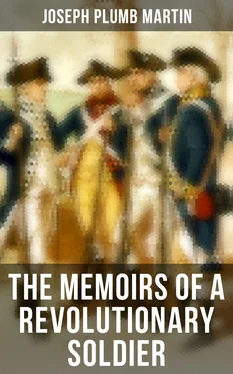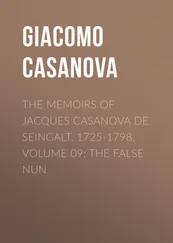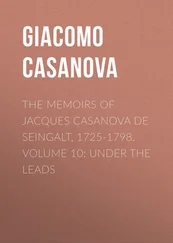Joseph Plumb Martin - The Memoirs of a Revolutionary Soldier
Здесь есть возможность читать онлайн «Joseph Plumb Martin - The Memoirs of a Revolutionary Soldier» — ознакомительный отрывок электронной книги совершенно бесплатно, а после прочтения отрывка купить полную версию. В некоторых случаях можно слушать аудио, скачать через торрент в формате fb2 и присутствует краткое содержание. Жанр: unrecognised, на английском языке. Описание произведения, (предисловие) а так же отзывы посетителей доступны на портале библиотеки ЛибКат.
- Название:The Memoirs of a Revolutionary Soldier
- Автор:
- Жанр:
- Год:неизвестен
- ISBN:нет данных
- Рейтинг книги:4 / 5. Голосов: 1
-
Избранное:Добавить в избранное
- Отзывы:
-
Ваша оценка:
- 80
- 1
- 2
- 3
- 4
- 5
The Memoirs of a Revolutionary Soldier: краткое содержание, описание и аннотация
Предлагаем к чтению аннотацию, описание, краткое содержание или предисловие (зависит от того, что написал сам автор книги «The Memoirs of a Revolutionary Soldier»). Если вы не нашли необходимую информацию о книге — напишите в комментариях, мы постараемся отыскать её.
Contents:
Campaign of 1776.
Campaign of 1777.
Campaign of 1778.
Campaign of 1779.
Campaign of 1780.
Campaign of 1781.
Campaign of 1782.
Campaign of 1783.
The Memoirs of a Revolutionary Soldier — читать онлайн ознакомительный отрывок
Ниже представлен текст книги, разбитый по страницам. Система сохранения места последней прочитанной страницы, позволяет с удобством читать онлайн бесплатно книгу «The Memoirs of a Revolutionary Soldier», без необходимости каждый раз заново искать на чём Вы остановились. Поставьте закладку, и сможете в любой момент перейти на страницу, на которой закончили чтение.
Интервал:
Закладка:
Joseph Plumb Martin
The Memoirs of a Revolutionary Soldier
Published by

Books
- Advanced Digital Solutions & High-Quality eBook Formatting -
musaicumbooks@okpublishing.info
2019 OK Publishing
EAN 4064066052744
Table of Contents
Preface
Chapter I. Introductory
Chapter II. Campaign of 1776
Chapter III. Campaign of 1777
Chapter IV. Campaign of 1778
Chapter V. Campaign of 1779
Chapter VI. Campaign of 1780
Chapter VII. Campaign of 1781
Chapter VIII. Campaign of 1782
Chapter IX. Campaign of 1783
"Long sleepless nights in heavy arms I've stood;
"And spent laborious days in dust and blood."
Pope's Homer.
Preface
Table of Contents
I have somewhere read of a Limner, who, when he had daubed a representation of some animal, was always compelled, for the information of the observer, to write under it what he intended it to represent: as, 'this is a goose,' 'this is a dog,' &c. So, many books, and mine in particular, amongst the rest, would perhaps be quite unintelligible as to the drift of them, unless the reader was informed beforehand what the author intended.
I shall, therefore, by way of preface, inform the reader that my intention is to give a succinct account of some of my adventures, dangers and sufferings during my several campaigns in the revolutionary army. My readers, (who, by the by, will, I hope, none of them be beyond the pale of my own neighbourhood,) must not expect any great transactions to be exhibited to their notice, "No alpine wonders thunder through my tale," but they are here, once for all, requested to bear it in mind, that they are not the achievements of an officer of high grade which they are perusing, but the common transactions of one of the lowest in station in an army, a private soldier.
Should the reader chance to ask himself this question, (and I think it very natural for him to do so,) how could any man of common sense ever spend his precious time in writing such a rhapsody of nonsense?—to satisfy his inquiring mind, I would inform him, that, as the adage says, "every crow thinks her own young the whitest," so every private soldier in an army thinks his particular services as essential to carry on the war he is engaged in, as the services of the most influential general; and why not? what could officers do without such men? Nothing at all. Alexander never could have conquered the world without private soldiers.
But, says the reader, this is low, the author gives us nothing but everyday occurrences; I could tell as good a story myself. Very true, Mr. Reader, every one can tell what he has done in his lifetime, but every one has not been a soldier, and consequently can know but little or nothing of the sufferings and fatigues incident to an army. All know everyday occurrences, but few know the hardships of the "tented field." I wish to have a better opinion of my readers, whoever they may be, than even to think that any of them would wish me to stretch the truth to furnish them with wonders that I never saw, or acts and deeds I never performed. I can give them no more than I have to give, and if they are dissatisfied after all, I must say I am sorry for them and myself too; for them, that they expect more than I can do, and myself, that I am so unlucky as not to have it in my power to please them.
But after all I have said, the real cause of my ever undertaking to rake up circumstances and actions that have so long rested in my own mind, and to spread them upon paper, was this:—my friends, and especially my juvenile friends have often urged me so to do; to oblige such, I undertook it, hoping it might save me often the trouble of verbally relating them.
The critical grammarian may find enough to feed his spleen upon, if he peruses the following pages; but I can inform him beforehand, I do not regard his sneers; if I cannot write grammatically, I can think, talk and feel like other men. Besides, if the common readers can understand it, it is all I desire; and to give them an idea, though but a faint one, of what the army suffered that gained and secured our independence, is all I wish. I never studied grammar an hour in my life, when I ought to have been doing that, I was forced to be studying the rules and articles of war.
As to punctuation, my narrative is in the same predicament as it is in respect to the other parts of grammar. I never learned the rules of punctuation any farther than just to assist in fixing a comma to the British depredations in the State of New-York; a semicolon in New-Jersey; a colon in Pennsylvania, and a final period in Virginia;—a note of interrogation, why we were made to suffer so much in so good and just a cause; and a note of admiration to all the world, that an army voluntarily engaged to serve their country, when starved, and naked, and suffering every thing short of death, (and thousands even that,) should be able to persevere through an eight years war, and come off conquerors at last!
But lest I should make my preface longer than my story, I will here bring it to a close.
Chapter I.
Introductory
Table of Contents
Have patience just to hear me out;
And I'll tell you what I've been about.
The heroes of all Histories, Narratives, Adventures, Novels and Romances, have, or are supposed to have ancestors, or some root from which they sprang. I conclude, then, that it is not altogether inconsistent to suppose that I had parents too. I shall not undertake to trace my pedigree (like the Welsh) some thousand years beyond the creation; but just observe, that my father was the son of a "substantial New England farmer," (as we Yankees say,) in the then Colony, but now State of Connecticut, and county of Windham. When my father arrived at puberty he found his constitution too feeble to endure manual labor, he therefore directed his views to gaining a livelihood by some other means. He, accordingly, fitted himself for, and entered as a student in Yale College, sometime between the years 1750 and '55. My mother was likewise a "farmer's daughter;" her native place was in the county of New-Haven, in the same State. She had a sister, married and settled in the vicinity of the College, who often boarded the students when sick. My father being once in that condition, and being at board at this aunt's, my mother happened to be there on a visit: my father seeing her, it seems, like a great many others in like circumstances, took a fancy to her, followed up his courtship, and very possibly obtained her consent as well as her parents—married her a year and a half before his collegial studies were ended, which, (if known at the time,) would have been cause of his expulsion from College; but it seems it never was known there, and he, of course, escaped a keelhaling.
After my father left College, he studied divinity, had "a call," accepted it, and was settled in the county of Berkshire, in the (now) Commonwealth of Massachusetts, as a gospel minister of the Congregational order; in which county of Berkshire, I, the redoubtable hero of this Narrative, first made my appearance in this crooked, fretful world, upon the twenty-first day of November, in the year 1760. I have been told that the day on which I was born was a thanksgiving day, which day is, generally, celebrated with good cheer. One might have thought it a little ominous being born upon such a day, but I can assure the reader it was no omen of good to me, especially for the seven or eight years I was in the army—nor, indeed ever since.
Читать дальшеИнтервал:
Закладка:
Похожие книги на «The Memoirs of a Revolutionary Soldier»
Представляем Вашему вниманию похожие книги на «The Memoirs of a Revolutionary Soldier» списком для выбора. Мы отобрали схожую по названию и смыслу литературу в надежде предоставить читателям больше вариантов отыскать новые, интересные, ещё непрочитанные произведения.
Обсуждение, отзывы о книге «The Memoirs of a Revolutionary Soldier» и просто собственные мнения читателей. Оставьте ваши комментарии, напишите, что Вы думаете о произведении, его смысле или главных героях. Укажите что конкретно понравилось, а что нет, и почему Вы так считаете.












